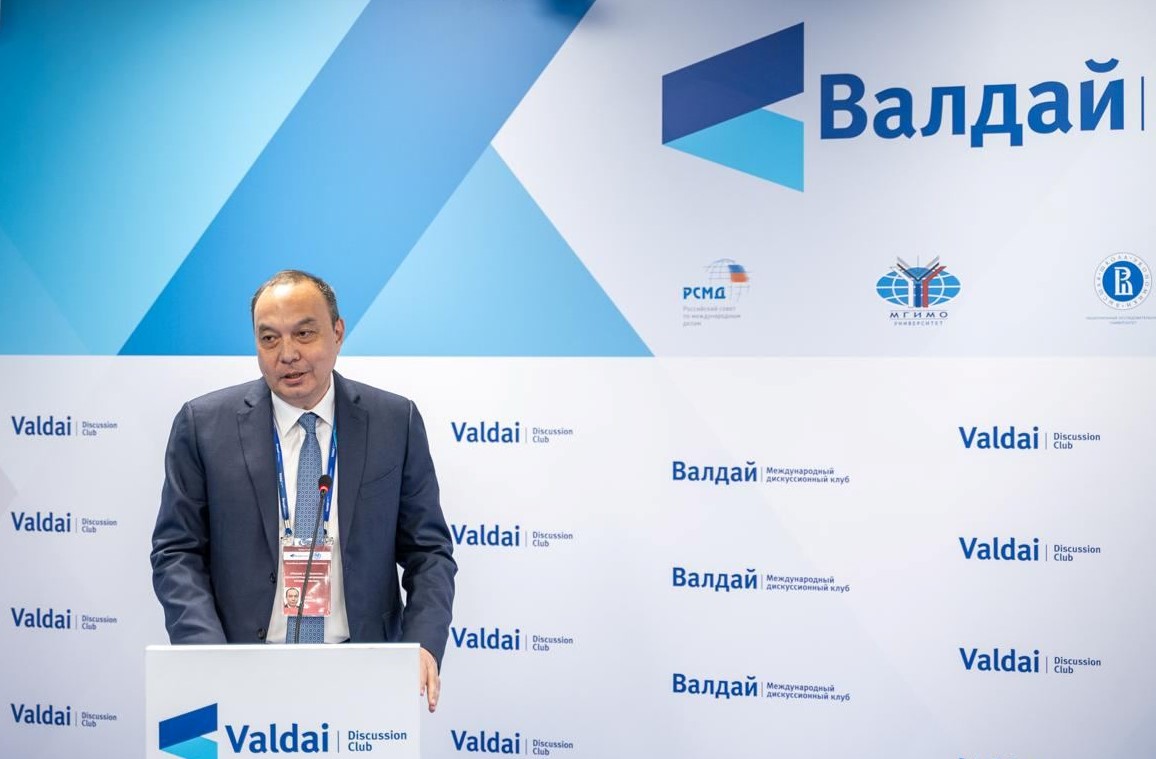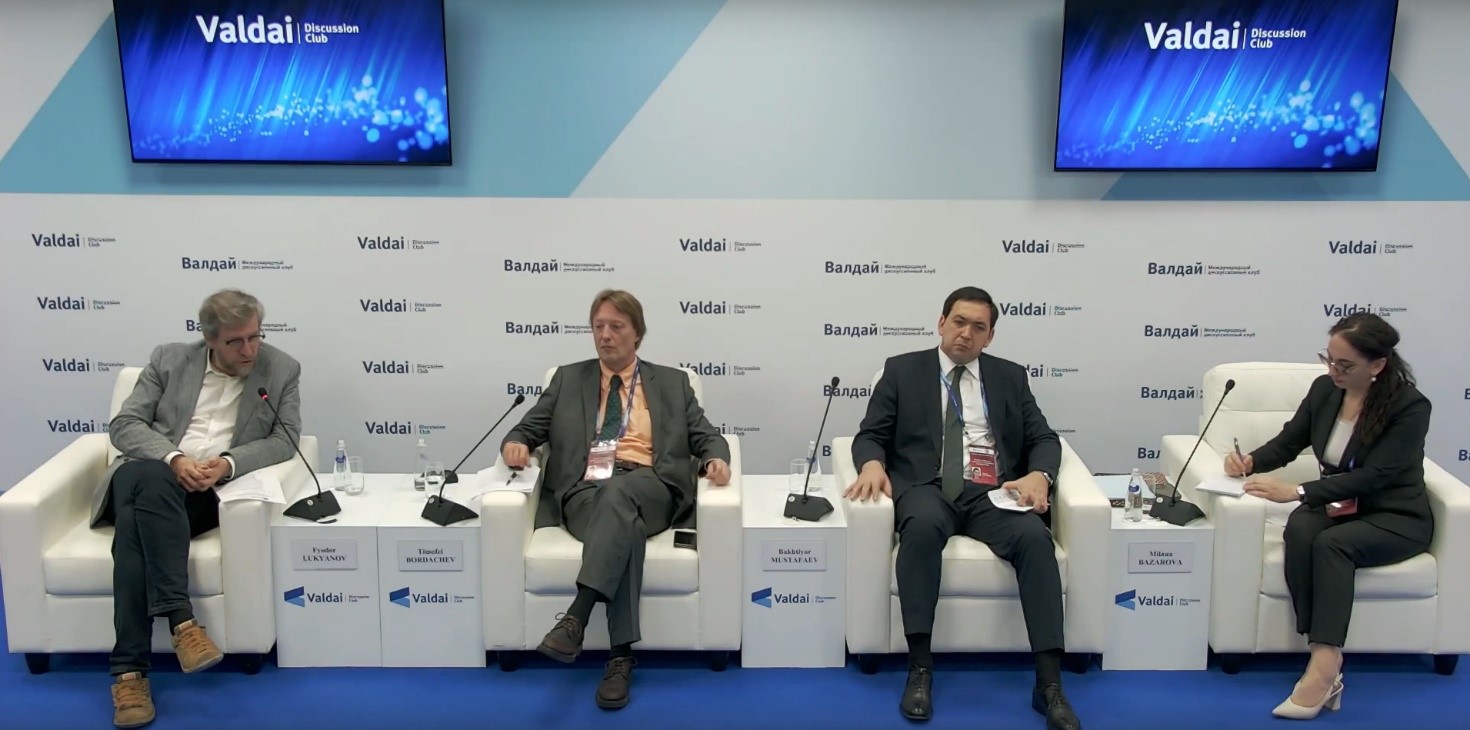Uzbek-Russian relations demonstrate dynamic development and stable growth

On May 27 this year, a conference entitled “Russia and Uzbekistan: Priority Areas of Cooperation” was held in Moscow, organized by the Valdai International Discussion Club in partnership with the Institute for Strategic and Regional Studies under the President of the Republic of Uzbekistan (ISRS).
Similar meetings of Uzbek and Russian experts in the format of bilateral sessions are held annually within the framework of cooperation between the ISRS and the Valdai Club established in 2019 in Samarkand.
The event was attended from the Uzbek side by the Director of the ISRS Eldor Aripov, the Director of the Center for Economic Research and Reforms Obid Khakimov, the Director of the Agency for Innovative Development Sharof Rajabbaev, the Deputy Director of the ISRS Bakhtiyor Mustafaev, the Head of the Department of the ISRS Milana Bazarova, the Project Manager of the Institute for Macroeconomic and Regional Studies Darya Ilyina, the Head of the Group for Monitoring and Evaluating Reforms of the Agency for Strategic Reforms Bekzod Kurbanov and others.
The Russian side was represented at the conference by experts such as Chair of the Board at the Foundation for Development and Support of the Valdai Discussion Club Andrey Bystritskiy, Research Director of the Foundation for Development and Support of the Valdai Discussion Club Fyodor Lukyanov, Program Director of the Valdai Club Timofei Bordachev, Dean of the Faculty of World Economy and International Affairs at the National Research University Higher School of Economics Anastasia Likhacheva, Head of the Central Asia Sector at the IMEMO RAS Stanislav Pritchin, Director of the Directorate of Digital Initiatives of the Eurasian Development Bank Viktor Shakhmatov, and others.
In his welcoming speech, Eldor Aripov stated that relations between Uzbekistan and Russia are currently experiencing their best times, demonstrating dynamic development and stable growth. It was emphasized that joint efforts have created a sustainable and effective model of interaction, based not just on declarations, but on real actions, effective steps that bring tangible mutual benefits and serve as a solid foundation for long-term strategic partnership.
Revealing the essence of the concept of interconnectedness put forward by the President of Uzbekistan, Eldor Aripov acknowledged the importance of abandoning the isolation of Afghanistan. Such an approach, in his opinion, will ultimately ensure stability, peace and development of the entire Eurasian region.
In addition, answering the question about the ideological basis of the reforms of the President of Uzbekistan, the head of the ISRS outlined the central idea of the ongoing reforms in the country - ensuring human dignity. "It was with this slogan that Shavkat Mirziyoyev went to the elections and received broad support," he explained. Uzbekistan's reforms are focused on key areas: expanding access to education, combating poverty, supporting entrepreneurship and strengthening good-neighborly relations in the region.
In his speech, Andrey Bystritskiy noted that today Russia and Uzbekistan are united by the coincidence of development goals. According to him, "there are many areas in which the countries could cooperate to respond to modern challenges and develop constructive cooperation."

In this context, Fyodor Lukyanov believes that "in terms of intensity and positivity of ties, there is few comparisons with the relations between Russia and Uzbekistan in recent years. We have learned to solve modern issues very effectively," he emphasized. In addition, according to the expert, Uzbek-Russian cooperation is acquiring a different scale in the context of broader tasks. He is convinced that "Uzbekistan and Russia are the supporting countries of the central Eurasian space, and their interaction acts as an anchor of stability in the region."
During the thematic sessions, the event participants focused on issues of finding new vectors of cooperation between Uzbekistan and Russia in the trade, economic, investment spheres, in the field of ensuring food security and the introduction of water-saving technologies.
Particular attention was paid to technological and innovative cooperation between the two countries, which covers such key areas as digital transformation, scientific and technological progress and industrial modernization.
Russian experts noted Uzbekistan's achievements in international rankings in the field of IT startup support, financial technology development and e-government. In this regard, interest was expressed in strengthening cooperation between the two countries, including by combining the experience of the Russian Federation and the human capital of Uzbekistan in implementing advanced digital solutions and scientific developments.

During the conference, the leadership of ISRS also met with the director of the Russian Institute for Strategic Studies (RISS) Mikhail Fradkov. During the conversation, issues of the current state and prospects of bilateral relations between Uzbekistan and Russia, as well as possible areas of cooperation between ISRS and RISS were discussed.
Next

On May 29 of this year, within the framework of the foresight seminar “Central Asia – 2050: Paving the Way to Joint Prosperity and Stability”, the Agency for Strategic Reforms under the President of the Republic of Uzbekistan (ASR) and the Institute for Strategic and Regional Studies under the President of the Republic of Uzbekistan (ISRS) organized a training seminar for specialists from analytical and research institutions.
31.05.2025





